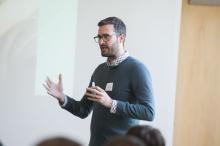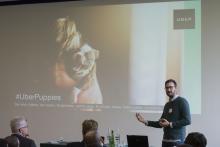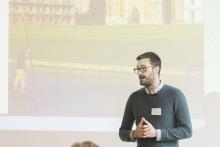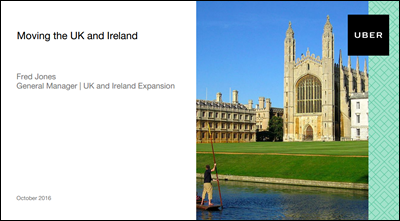Fred Jones
Fred Jones, General Manager, UK Expansion, Uber
Disruptive Service Business Models: Experiences and Lessons from Uber
Fred Jones is currently the General Manager for Uber, UK&I Expansion. He is responsible for starting and growing operations across multiple cities in the UK and Ireland outside London. Previously, Fred was the UK Lead for Accenture’s Corporate Strategy and Value Analysis team supporting sales, strategic insight and client relationship development at priority clients. Fred has been an advisor to a number of early stage tech start-ups and social enterprises. He provides hands-on support to Founders helping them to develop high-growth business models, executable strategies and compelling business plans as part of Seed, Angel and Series A funding rounds. Outside of work, Outside of work Fred has been a guest lecturer at the University of Bath, School of Management.
Fred Jones' Presentation at Service Week 2016:
Podcast Interview with Fred Jones during Service Week 2016:
Please allow social and marketing cookies to show embedded content.
Transcript of Podcast:
Our two co-founders, Garrett and Travis, back in the early 2000s were visiting LeWeb conference in Paris. Those who have been to Paris know that it is a very  difficult city to get a taxi in, and they were standing on the street corner, late at night in the cold. They had the brainwave that wouldn’t it be cool to take out your phone, tap a button and get a ride, and that is where the thought and inspiration for Uber started. Travis was already a successful entrepreneur in Silicon Valley, so he could see the potential, and see where he could take this idea.
difficult city to get a taxi in, and they were standing on the street corner, late at night in the cold. They had the brainwave that wouldn’t it be cool to take out your phone, tap a button and get a ride, and that is where the thought and inspiration for Uber started. Travis was already a successful entrepreneur in Silicon Valley, so he could see the potential, and see where he could take this idea.
We want to make transportation as reliable as running water for everyone, everywhere. I know a number of important things are part of that vision. Transportation should be so affordable that everyone can use it – it shouldn’t just be for the privileged few or those that live in city centres. It should also be available no matter where you live. If you are on a night out in the middle of town, or if you’re the end of the train line, a couple of miles from the city centre, everyone should have access to that.
We have riders and partner drivers. The riders are people like you and me, who just want to get a ride at the tap of a button. The partner drivers, these are licensed drivers who want to partner with us on the platform and have a really flexible way of making great money. One of the biggest misconceptions of our business are that our drivers aren’t licensed or regulated. Every partner driver has been licensed by their local council, and that means they’ve had a DBS background check – the same as taxi drivers or care workers – they’ve been through all the necessary tests that the council requires, and they have a vehicle that is fully insured and compliant with the safety standards of that council. That’s really important to us, not just to deliver a great service, but for peace of mind for the riders as well.
We are now in over 20 major cities and towns in the UK and Ireland, and our vision is to continue to grow that. Going back to our vision, of transportation as reliable as running water for everyone, everywhere, we certainly want to deliver that in the UK. We’ve still got a lot of work to do and there is a huge demand from riders and partner drivers to come to the cities that we haven’t yet launched in. Partner drivers  average about 27 hours a week, and often have other professions, and are able to tap into Uber to drive to earn extra money. This is a platform and a way for drivers to make good extra money, that everyone needs, whether to save for a holiday or a home, to fund further education or study or just to help make ends meet. I think it is really empowering for individuals who see the opportunity and join us.
average about 27 hours a week, and often have other professions, and are able to tap into Uber to drive to earn extra money. This is a platform and a way for drivers to make good extra money, that everyone needs, whether to save for a holiday or a home, to fund further education or study or just to help make ends meet. I think it is really empowering for individuals who see the opportunity and join us.
Being a technology company, as with many others, data is critical to decision making and improving our business to deliver a better service to the riders and drivers. Something that is great about Uber is its reliability that drivers and riders have, so we need to really understand how we are performing and look into the data to deliver that reliability.
Often the rides are very short. The data that I showed around London and how we compliment public transport there is replicated throughout the UK in all major cities and towns and the transport networks they have. We really see Uber solving for that last mile and filling in between the gaps. If you can get someone to the train or bus station then that suddenly makes bus and train travel a reality. We are really excited to play that role in transforming the cities and helping to support the big investments in transport that many of our cities are making in the future.
 The growth in Uber has come from a number of different dimensions. The first has been international expansion and growth into new cities, so we are now in over 400 cities globally. It is also around the popularity and ubiquity of our riders. An interesting stat around that was that over the summer on the south coast of the UK, 41 percent of riders had actually signed up and used the app previously in another country. When they arrived in the UK, they opened it up and Uber was the natural choice for them. I think that kind of network effect and cycle of growth is certainly something that has benefited us too.
The growth in Uber has come from a number of different dimensions. The first has been international expansion and growth into new cities, so we are now in over 400 cities globally. It is also around the popularity and ubiquity of our riders. An interesting stat around that was that over the summer on the south coast of the UK, 41 percent of riders had actually signed up and used the app previously in another country. When they arrived in the UK, they opened it up and Uber was the natural choice for them. I think that kind of network effect and cycle of growth is certainly something that has benefited us too.
Since its launch, UberPOOL in London, which is our ride-sharing business, has helped take 1.3 million miles off the road, and that is just in London in less than a year. Obviously the impact on that in reducing congestion, taking CO2 out of the air is pretty astounding. I think most people, when you speak to them, and explain that this vision is actually a reality happening right now are pretty excited about the benefits we can bring. Some of the real problems that cities are facing right now, Uber can be part of the solution.
We are bringing competition to an industry that hasn’t really changed much in decades, if not a hundred years, so naturally that competition is going to be challenging for some. But I think that when you step back and look at what we provide, and the popularity with our partner drivers and with our riders, and the benefits we can bring to cities that, actually, that vision and that reality are so compelling and exciting that everyone is really motivated to help us succeed.
Ultimately we have built a logistics platform. We want to give our customers and our consumers what they want when they want it. You can get a ride with us at the touch of a button. Now with UberEATS you can get restaurant food delivered to you in a matter of minutes at the push of a button. UberRUSH helps with last mile logistics for small businesses. You can see how we can take the concept of Uber much more broadly. We often have a bit of fun, and one of our stunts is UberIceCream. On a set day each year you can take out your phone and push and get some ice cream delivered to you at your home or work place. Because we are a market place we work really hard on keeping our partner drivers efficient, so the busier they are the more money they can make and it makes the service more affordable to lots of riders, and the more affordable it is the more people will use it and the busier our drivers will be. It is an advantage to both the customers and the partner drivers.
If you speak to any private hire and taxi driver they will tell you the thing they fear most is dead mileage, sitting around and doing nothing, not making money or driving a long distance to pick up a fare. By working really hard to reduce that dead mileage and dead time by keeping our drivers busier on the platform, that is where we can get the real benefit, at the margins. That is where we focus much of our attention and engineering effort.

